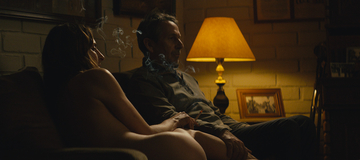Los Perros follows in the path of The Summer of Flying Fish (2013) in dealing with spine-chilling and tensed relations between the wealthy land owners and the Indians and touching the raw nerve of a new breach in the Chilean society. The film tackles the consequences of the Pinochet dictatorship in the present-day Chile, settling its score with the rich bourgeoisie of business whose impunity is protected by the triumphant hypocrisy. “Some years ago, during the shooting of a documentary, I met some servicemen who were being prosecuted for crimes committed during the Pinochet regime. I was surprised to see that they felt betrayed by the civilian world who had encouraged and financed them. I then realised that these servicemen were but pawns in the midst of a very complex game, consisting in establishing a new economical system by winners who would get away with it.”
In order to conduct her trial, Marcela Said conceived a very disturbing female character. Her progression is unpredictable, nourished by the extraordinary battle of a woman one is eager to follow as she gains the spectator’s empathy and support, until she goes too fast too far, letting us behind with a very obvious feeling we’d already felt for the heroins in Paulina (Santiago Mitre) or The Kindergarden Teacher (Nadav Lapid). “Mariana is a very complex character, I wanted her to be authentic, which means fragile and strong at the same time, vulnerable, curious, ambiguous, funny. I wanted to go against certain types of female protagonists, because this woman belongs to a bourgeoisie never betraying their own kin who all live in denial. I knew these things since the beginning and they were a new form of truth to me.” This is the price to pay for this woman’s commitment, a very uneasy one, keeping us alert before the disquieting reality.







